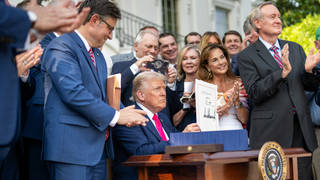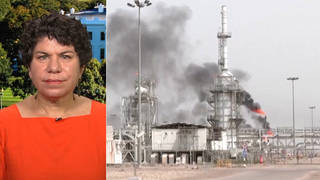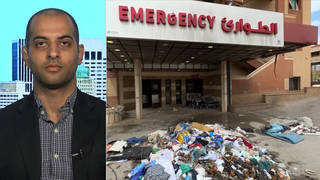
Guests
- Katie Endicotthigh school English teacher in Mingo County, West Virginia, and member of the West Virginia Education Association, one of the organizations that represented the striking teachers.
In West Virginia, teachers have ended their historic strike, after state officials agreed to raise the pay of all state workers by 5 percent. The strike began on February 22 and shut down every public school in the state. It was the longest teachers’ strike in West Virginia history. For more, we speak with Katie Endicott, a high school teacher and union activist in Mingo County, West Virginia.
Transcript
AMY GOODMAN: We begin today’s show in West Virginia.
WEST VIRGINIA TEACHERS: Who made history? We made history! Who made history? We made history! Who made history? We made history! Who made history? We made history!
AMY GOODMAN: That’s the sound of striking teachers in West Virginia celebrating on Wednesday after winning a 5 percent raise for all workers, as they chanted, “Who made history? We made history!” The wildcat strike began on February 22nd and shut down every public school in the state. It was the longest teachers’ strike in West Virginia history. The governor, Jim Justice, signed the bill to raise salaries during a news conference Tuesday.
GOV. JIM JUSTICE: Today is a new day for education in West Virginia. We will move forward. No more looking back. West Virginia renews its investment in education and our precious children today.
AMY GOODMAN: Teachers cheered and sang in the halls of the state Capitol in Charleston after the pay raise was announced. West Virginia ranked 46th among the 50 U.S. states for average teacher pay last year, according to the National Education Association. One teacher explained the motive for the strike.
WEST VIRGINIA TEACHER: It’s been very hard, because, you know, the teachers have been vilified, and they want to be in school just as bad as the parents want the kids to be there. But, you know, this has been going on for so many years. And people just—the teachers finally said enough is enough.
AMY GOODMAN: While the state’s Republican-controlled House of Delegates and Senate were able to reconcile differing bills regarding salary increases, lawmakers have not yet answered teachers’ demands for a cap on spiraling healthcare costs. West Virginia Governor Justice signed an executive order appointing a task force to address the issue. The committee will hold its first meeting next week.
The strike in West Virginia has also inspired teachers in other states. On Tuesday, the Oklahoma Education Association announced teachers would go on strike April 23rd if the state Legislature doesn’t approve pay increases and funding for educational needs. They are the worst-paid teachers in the country.
For more, we’re joined by two guests. In Charleston, we go to Katie Endicott, a high school teacher and union activist in Mingo County, West Virginia. And in Tulsa. Oklahoma, Teresa Danks is with us, an elementary school teacher. She made headlines last year when she panhandled on the side of the road to raise money for schools. She’s since started a foundation called Begging for Education, dedicated to classroom funding, improving teachers’ salaries and fiscal responsibility in Oklahoma.
I welcome you both to Democracy Now! Katie Endicott, let’s begin with you in Charleston, in the Capitol building there. Can you explain the victory that you’ve achieved, what you think you’ve achieved and what you feel needs still to be done?
KATIE ENDICOTT: Yesterday was truly one of the greatest days of my life. We were in the Capitol yesterday. I was here with a group of colleagues. And when we walked in, we fully anticipated that this fight was going to continue. We thought that we would leave, and we would come back on Wednesday to the Capitol. And when we found out that the fight was over and that we won, tears were just streaming down our faces. We were overwhelmed with emotion, because we won. We saw democracy in action. We saw the power of unity. People from all across the state were coming together, unified with one goal, with one mindset. And we achieved it, against all odds. There were so many people who said that we would never get what we wanted. There were so many people who said they would laugh us out of the Capitol. They did not laugh us out of the Capitol, because we did not leave the Capitol. And so, it was an amazing day. It’s been an amazing process to witness and to live history.
We know that this is not over. We know that this is just one moment in a much larger movement. And so, yesterday, on the way home, the talk already shifted to: What are we doing next? And so, we want to be involved. We’re going to be volunteering on campaigns. We’re going to be going door-knocking for candidates that we believe in. And we certainly do not believe that this is over. We believe that we are just starting.
AMY GOODMAN: So, for people who haven’t been following this historic strike, what—this was the largest wildcat strike in West Virginia history, one of the largest strikes in West Virginia history, as well, the long nine days. Can you explain what a wildcat strike is and how this strike progressed? Because there was a point last week when the governor said, “We’re giving you the raise,” and then you stayed, and you pulled back, because you said it’s not what you had demanded.
KATIE ENDICOTT: Yes. Striking is actually illegal. We were never encouraged to strike. However, our unions were very supportive of us, and they told us upfront, “You could lose your job. You could lose seniority. Here’s all of the risks. But if you choose to, then we will stand beside you, and we will support you.” And we decided, almost unanimously in my county, that we were going to strike. We actually—prior to February 22nd, there were four counties in West Virginia who decided to conduct a 1-day work stoppage on February 2nd. And we believe that that was the spark that sort of set this whole process in motion.
And on that day, like I said, there were people that said, “They will laugh you out of the Capitol.” And we showed up, and there were thousands of people here. And from that point on, it continued. We warned. We told them that we were going to strike. We chanted that here on February 2nd. We said, “We will strike. We will strike.” And I do not believe that they heeded that, that they paid attention. And so, sure enough, we showed right back up on February 22nd, and we didn’t leave until all of our demands were met.
AMY GOODMAN: But once you struck, there was an agreement that you struck with the governor. And explain what happened with the Legislature.
KATIE ENDICOTT: Yes. So, we—our union leaders met with our governor. I was here that night. It was a Tuesday night, I believe. I had been on a local picket line. And then I drove to Charleston and was here for—we were told there was going to be an announcement made. And at the beginning of that announcement, everyone was very positive. We thought we had won at that point. And then, when people came out and they started telling us—our union leaders and so forth, when they started coming out and telling us that the governor had agreed to a 5 percent raise and that PEIA, which is our insurance—it’s an acronym for our insurance program—when they told us that that would remain frozen, the crowd immediately started chanting, “See you tomorrow! See you tomorrow!”
The governor had agreed with union leaders that we would have a cool-off day. And so, we were not scheduled to go back to school until Thursday. Our leadership had agreed that we would go back on Thursday in good faith. But the people of West Virginia, they said, “No, we are not going to go back in good faith. You have to”—this is the line we’ve been using—”You have to sign, seal and deliver it.” And so, we were determined that we were not going back.
I went through the hallway on Wednesday during the cool-off day, and I was trying to talk to union leaders. And we were all very clear: We are not going back. We had union meetings across the state. Some people met here on the steps of the Capitol with their union members. And we voted instantly. And it was overwhelming. Everyone was coming through the Capitol, and they were saying, “What’s Mingo County doing? What’s Mason County doing? What’s Logan County doing?” And everybody was saying, “We’re not going back. We are not going to go back until they fix this.” And so, together we stood. And in spite of a tentative agreement, we said, “You can say that. You can make us promises. But you have to actually follow through. Promises alone are not enough. We want it in writing.”
AMY GOODMAN: So, yesterday, you achieved a part of what you asked for, enough to return. I wanted to go to the news conference of the Republican governor, of West Virginia’s Governor James Justice, questioned whether the teachers’ salary increases would be paid for through cuts to Medicaid.
QUESTIONER: You tweeted this morning that you found additional budget cuts to pay for the raises. And the Senate Finance Chairman Blair said these would be deep cuts, $20 million in general service programs, as well as Medicaid. So, are you saying that this, what you’re about to sign, not only does not address the full funding of the PEIA, but it could also be paid for through cuts to low-income and poor children in their Medicaid, children that teachers teach?
GOV. JIM JUSTICE: There is not a chance on this planet that’s going to be the case. And the reason it’s not going to be the case is we have—we have cash-ending balances in Medicaid that will absolutely backstop any cuts whatsoever to Medicaid. And we will not let our people that are on Medicaid suffer in any way.
AMY GOODMAN: So that’s Governor Justice. Katie Endicott, your response?
KATIE ENDICOTT: Through this process, I’ve been so empowered and encouraged to see certain ways that the legislative process works. I’ve also been very discouraged at moments, because we have witnessed the ugly side of politics. And I believe that yesterday, and prior to yesterday, we witnessed that. We witnessed this divisive rhetoric that was meant to divide and vilify teachers and to take away from this monumentous victory that we have achieved. We do believe the governor, we believe our union leadership, that there is no way that Medicaid will lack any funding. It will be fully funded. And we trust our Democratic senators that—and our Republican allies that have stood with us through this process, that they would not dare take away from the children of our state.
AMY GOODMAN: Another clip of Governor Justice. A major point of contention in the negotiations, the teachers’ demand for relief from the rising costs of health insurance, as you’ve described, assessed by the West Virginia Public Employees Insurance Agency, or PEIA. Governor Justice announced plans to address the issue during his news conference.
GOV. JIM JUSTICE: You know we have created a PEIA task force. And you know I have done my appointments, and we’re waiting on some others to get names to us and get it all put together. And it’s just like anything else, whether you budget at your house or whatever you do. At times, it takes a little longer. And now we’re looking at that all the appointments will be in place by Thursday.
AMY GOODMAN: So, Katie Endicott, this idea of setting up a commission that will look at healthcare, how do teachers feel about this?
KATIE ENDICOTT: We’re encouraged by the task force. Initially, we were very skeptical, and we were not ready to return to the classroom just on a promise. However, the executive order certainly helped calm and alleviate a lot of our fears. And so, we know that he has put it in writing. We know that this is not a short-term fix. And we know that it can’t be fixed within a couple of days. So, we wanted to know who would be on that task force. We wanted to make sure that we had representation and that there would be people on that task force that would be speaking for us and that would be our champions. And we believe that we have achieved that. And we are encouraged that there is a date set and that this will come to fruition and that there will be changes made. We do have a freeze in place right now. We did not think that the freeze was enough. But the freeze with the task force certainly helps provide hope for us that there will be a long-term fix and a solution to PEIA.
AMY GOODMAN: I wanted to bring Teresa Danks into the conversation, third-grade teacher from Tulsa, Oklahoma. I mean, the numbers have ranged, Katie, in—when it comes to West Virginia, that teachers get somewhere between—you’re like the second-lowest paid in the country, at 48, 46. Really low pay. What do teachers start at in West Virginia, Katie?
KATIE ENDICOTT: The average beginning teacher salary is $33,000 a year. And we are 48th in the nation. So, this has been a fight, of course, for insurance, but also pay, as well.












Media Options